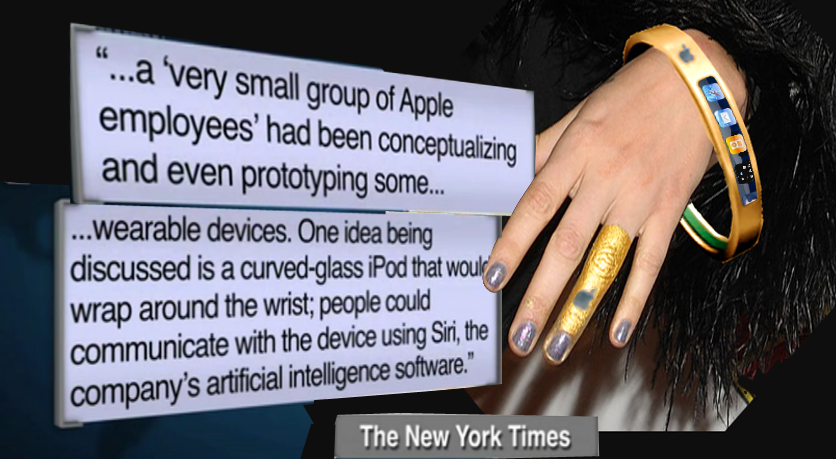 Apple has today announced release of its much rumored iBracelet.
Apple has today announced release of its much rumored iBracelet.
Going even beyond Apple’s legendary sense of design, the iBracelet is much more than a fashion accessory! Combining a gold bracelt with Apple’s new “Goldfinger” pointing device, the iBracelet is the ultimate in personal ties to Apple’s iCloud services.
( from ASSOCIATED PRESS , WASHINGTON) —Each iBracelet comes with the Web-based registry, invisibleBracelet.org. Started in Oklahoma, the iBracelet iHealth registry got a boost when Oklahoma teamed up with the American Ambulance Association and the American Automobile Association, to offer iBracelets as ab optional health benefit for all State employees.Of course the state program was called the AAA registry.
Now, produced by Apple, the iBracelet goes nationwide with the AAA auto club teaming up with Apple and Aetna insurance and AT&T! Aetna and AT&T will offer the iBracelet at a discount to all AT&T subscribers who to sign up for either the registry or transfer the health insurance to Aetna. For $5 a year, health information and up to 10 emergency contacts are stored under a computer-assigned secret number that is matched to the serial number of each bracelet.
It’s a complement to the medical alert jewelry that people with diabetes, asthma and a host of other conditions have used for decades to signal their needs in an emergency.
“Too many times, we don’t have the information to help us treat the patients correctly,” says James Finger, president of the American Ambulance Association.
Even someone too healthy for those bracelets may have a condition that could help emergency workers make a faster diagnosis, avoid a medication reaction or track down their next-of-kin faster.
The question is how to make sensitive medical data easily accessible to emergency workers without violating federal health-privacy laws. Options range from simple bracelets to pricier key-chain flash drives, implanted microchips — and call-centers that relay stored health records and notify relatives when an alarm or medic’s phone call activates the system.
Rapid family notification is crucial, says Stephen Williamson, president of Oklahoma’s Emergency Medical Services Authority — and one reason his emergency provider recently trained to use the new Invisible Bracelet.
A medical alarm necklace Williamson bought for his mother called an ambulance when she fell, but didn’t alert him as promised until 11 hours after he learned of her hospitalization on his own.
And when his wife suffered a brain aneurysm a year ago, Williamson called for help and got her in the ambulance — only to freeze, unable to remember how to contact their daughters.
“I’m in the business of emergencies. … But I just stared at my phone. I couldn’t figure out for, honest to God, five minutes it seemed like, ‘What do I do?’” Williamson recalls. “I’d much rather have known that’s being handled and left for the hospital.”
Enter the iBracelet. Only authorized medics can access a Web site that reads the PIN and opens the health info they use to treat the patient.

I wrote up a few provisional patents on this idea back in 2000.